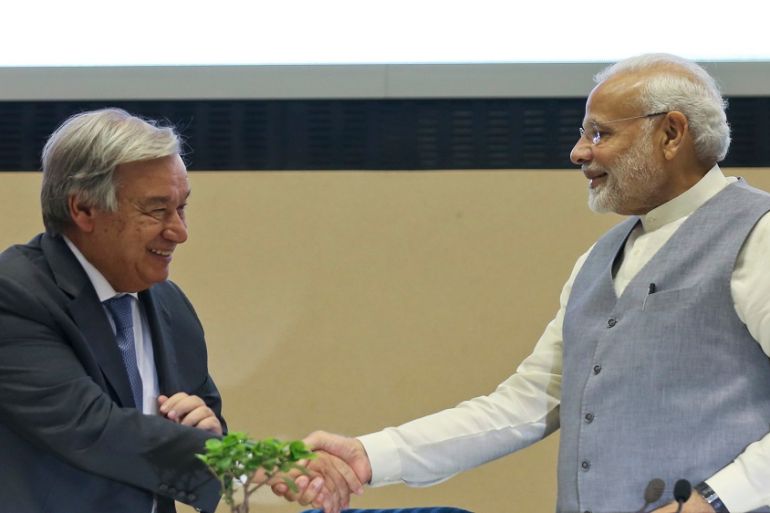Solar Alliance can replace OPEC as key energy supplier: Modi
At the first International Solar Alliance summit, Modi says role of ‘oil wells today will be that of the sun tomorrow’.

An India-led coalition of nations aims to harness solar energy, which it says will eventually replace the Organisation of Petroleum Exporting Countries (OPEC) oil cartel.
“The role of the oil wells today will be that of the sun’s rays tomorrow,” India’s Prime Minister Narendra Modi said in capital New Delhi on Tuesday.
Keep reading
list of 4 itemsAfter the Hurricane
World’s coral reefs face global bleaching crisis
Why is Germany maintaining economic ties with China?
Modi was speaking at the first assembly of the International Solar Alliance (ISA), which was also attended by United Nations Secretary-General Antonio Guterres.
“In the coming years, when the world discusses initiatives for the welfare of humanity in the 21st century, ISA’s name will be at the top,” Modi said.
The OPEC pumps around a third of the world’s oil, and over decades has been able to influence the global energy market by controlling the price of crude.
“The International Solar Alliance represents exactly what needs to be done and represents the future,” Guterres said.
“We know what we need to do, and by and large, we have the tools to do it. What we still lack, fortunately not here in this room … is the political commitment to make the transformative decisions that will lead us on to a safer path,” he said.
On Wednesday, Guterres also presented Modi the Champions of the Earth Award, the UN’s highest environmental honour, which the Indian leader shares with French President Emmanuel Macron.
The world needs bold leadership on #climateaction. I thank India for setting an example and was pleased to present Prime Minister @narendramodi with the Champions of the Earth Award pic.twitter.com/QchKIOVdQP
— António Guterres (@antonioguterres) October 3, 2018
What is ISA?
The ISA, launched by Modi and then-French President Francois Hollande in 2015 and based in India, is an alliance of countries mostly between the Tropics of Cancer and Capricorn that receive plentiful sunshine.
It aims to reduce the costs of financing solar power and its required technology and to mobilise more than a trillion dollars to build solar facilities and infrastructure by 2030.
The ISA’s first assembly, involving member states, banks, development funds, the corporate sector and civil society groups, is due to run until Friday.
India’s population of 1.3 billion is particularly vulnerable to climate change.
In August, unprecedented rains pounded the southern state of Kerala, displacing 1.3 million people, with climate scientists warning the worse is yet to come if global warming continues.
With only a single degree Celsius of warming so far, the world has seen a climate-enhanced crescendo of deadly heat waves and floods, along with superstorms swollen by rising seas.